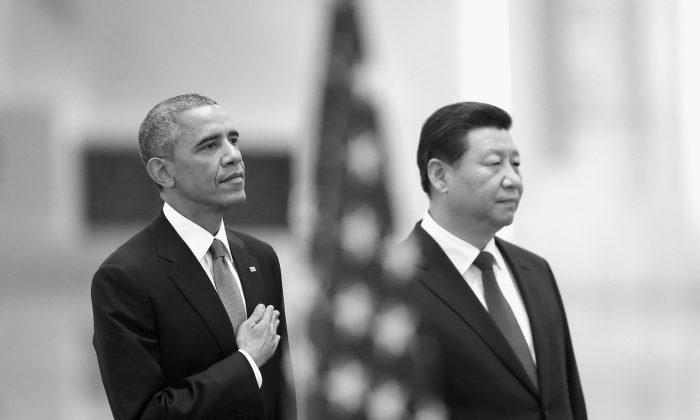The talks between U.S. President Barack Obama and Chinese Communist Party head Xi Jinping during the just concluded APEC meetings in Beijing were a focus for both nations, with long-negotiated deals inked and a joint press conference to announce the results of their meeting. However, two U.S.-based China analysts believe such summitry with Chinese leaders cannot heal relations that are bound to remain shaky and divided.
Special columnist for Fox News and long-time China expert Gordon Chang said that the United States should forgo secret talks with the communist leadership. He recommends the application of pressure on the regime to work on fixing its violations of basic international standards in trade and human rights.
Xia Yeliang, a China analyst at the Cato Institute, a Washington DC-based think tank, stressed that because of the communist regime’s repeated lack of respect for internationally accepted regulations and values, China cannot be treated as an upstanding world power.
A former professor at China’s prestigious Beijing University, Xia Yeliang was dismissed in October 2013 because of his outspoken criticism of China’s Communist Party and his advocacy of democracy and human rights.
“China’s regime is not beholden to any boundary,” Xia said in an interview with Epoch Times. “If China doesn’t respect human rights, it can’t be treated like an international power.”
According to Xia, by not directly supporting China’s call for a “new model of great power relations,” Obama “has basically refused to acknowledge the Chinese regime’s fantasy.”
Gordon Chang, author of the 2001 book The Coming Collapse of China, has long said that China, being run by an ideologically illiberal regime, can neither maintain sustainable economic growth nor pursue a rational foreign policy.
“Chinese leaders,” he wrote in an article published by the Gatestone Institute, “distrust us [the U.S.] because they see themselves as the protector of an ideology threatened by free societies. The mistrust is inherent in their one-party state. It can never be relieved as long as the Communist Party remains in power.”
Chang has maintained the position that the United States can and should operate from a position of strength, rather than show weakness by treating the communist regime as an equal diplomatic partner.
“Instead of going to Beijing, we should insist on Chinese leaders coming to Washington to explain their predatory trade tactics, their attempts to deny freedom of navigation, their proliferation of nuclear weapons technology to Iran and North Korea, and their unprecedented cyber-attacks on our networks, among other irresponsible acts,” Chang wrote in a Fox News piece.
The recent factional infighting in Beijing, according to Chang, is a symptom of China’s authoritarian system that renders America’s vague and conciliatory diplomatic overtures ineffective.
“As they [the Communist Party leaders] slug it out, literally and figuratively, working with the U.S. may not only be low on the list of their priorities,” Chang wrote in the World Affairs Journal. “It may even be considered politically dangerous.”
Gordon Chang, pointing at the militaristic, jingoistic tone of Chinese state media reports, has said that the United States cannot show weakness in the face of the communist regime. “If we cannot say those things clearly, the Chinese will think we are afraid of them. If they think we are afraid of them, they will act accordingly. I repeat: bad things happen when your adversary does not respect you.”
With reporting by Leo Timm



Friends Read Free